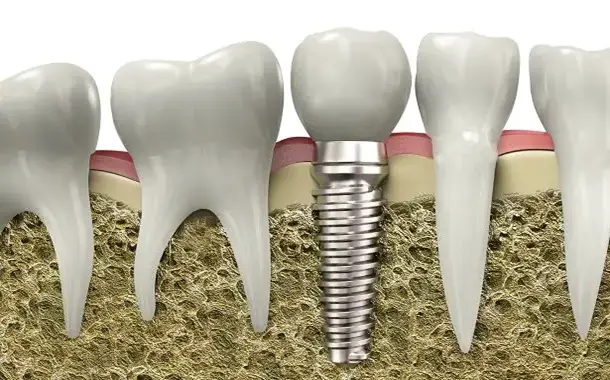How Much do Dental Implants Cost?
Last Updated on February 4, 2024
Written by CPA Alec Pow | Content Reviewed by ![]() CFA Alexander Popinker
CFA Alexander Popinker
Dental implants can be an excellent solution for missing or damaged teeth, but the costs involved often make people hesitant to take this step. In this comprehensive guide, we’ll break down the various factors that influence dental implant pricing and provide cost estimates to help you plan this major dental investment.
How Much do Dental Implants Cost?
The total cost of a single implant is anywhere between $1,000 and $4 or more for the implant alone. The total cost depends on several factors:
- Number of implants – The per implant cost is $1,000-$4,000. Full mouth cases require 10-12 implants.
- Implant materials – Basic titanium implants cost $1,000-$2,000 per tooth. Advanced zirconia or titanium implants are $2,000-$4,000.
- Implant brand – Premium brands like Straumann or Nobel Biocare are more expensive.
- Bone grafting – Needed for poor bone density, adding $500-$3,000 per grafted site.
- CT scans – 3D planning scans typically cost $300-$700.
- Abutment and crown – The abutment is $500-$1,500, crowns $500-$2,000 each.
- Oral surgeon fees – Implant specialist costs are $1,500-$4,000 per implant.
- Anesthesia and medications – IV sedation and prescriptions add a few hundred dollars.
GoodRx, for example, notes that the cost of one dental implant treatment with a porcelain crown is about $4,800, with prices ranging from $3,500 to $6,700. The average cost for a full mouth of implants is around $43,000 and may be as much as $56,000.
According to Aspen Dental, a single dental implant starts at $2,240.
Forbes Health notes that the total cost per tooth, start to finish, normally runs between $3,000 and $4,500.
Rejuvenation Health writes that the average cost of dental implants ranges from $3,000-$8,000 per tooth in the United States. A full mouth of dental implants costs anywhere from $46,000-$80,000.
An Overview of Dental Implant Treatments
Dental implants are small titanium posts that are surgically inserted into the jawbone to replace missing tooth roots. A crown is then attached to the implant post to complete the tooth restoration. Implants not only look and function like natural teeth, but they also stimulate bone growth and prevent jawbone loss.
For many patients with one or more missing teeth, implants are the best long-term tooth replacement option. While more expensive initially than bridges or dentures, implants have a high success rate and can last decades with proper care.
Understanding the full costs and benefits of implants is key to making an informed decision about this permanent tooth replacement method.
The Different Types of Dental Implants
There are a few main types of dental implants, which can have an impact on overall pricing:
- Endosteal implants – The most common type. These are directly fused into the jawbone through surgery.
- Subperiosteal implants – Placed above the jawbone and under the gums. Used for patients with minimal bone height.
- Micro mini implants – Smaller diameter implants for replacing smaller teeth.
- All-on-4 implants – Four implants to support a full arch of teeth. Lower cost than individual implants.
The specific implant system recommended by your dentist will depend on your unique mouth structure and needs. More complex cases usually require custom-milled implant parts, which influences cost.
Factors That Determine Dental Implant Costs
The total cost of your dental implant procedure will depend on several key factors:
- Number of implants – More implants means higher overall cost. The per implant cost ranges from $1,000-$4,000.
- Implant materials – Advanced materials like zirconia or titanium implants cost more than basic titanium.
- Bone grafting – Needed if your jawbone density is low, adding $500-$3000 per site grafted.
- Guided implant surgery – 3D planning and placement using a surgical guide costs extra.
- CT scans – 3D scans to precisely plan implant placement add $300-$700.
- Type of abutment and crown – The attachment and artificial tooth add cost.
- Clinic/dentist – Implant specialists are more expensive than general dentists.
- Location – Cost of living differences across geographic areas.
Step-By-Step: The Dental Implant Process
To better understand the costs involved, let’s walk through the implant timeline from start to finish:
- Consultation – The dentist will assess your needs and develop a treatment plan with cost estimates.
- Initial scan – A CT scan helps precisely plan the surgery.
- Tooth extraction – Any damaged teeth are removed.
- Bone grafting – This adds stability and support if needed.
- Implant placement surgery – The titanium posts are secured into the jawbone.
- Healing time – Gums must heal before the abutments and crowns are added.
- Abutment and crown attachment – Artificial teeth mounted to complete the restoration.
- Follow up visits – To monitor healing and function.
Proper post-operative dental care is vital for ensuring your implants last.
Choosing the Right Dental Implant Specialist
One way to manage implant costs is to shop around with different dental implant clinics and specialists. Key factors in choosing a provider include:
- Their implant training and experience – More complex cases require an expert.
- The types of implants offered – Some dentists only provide a limited selection.
- Use of advanced technology – Guided surgery, CT scans, dental labs.
- Comfort level – Make sure you can openly communicate with the dentist.
- Convenience – Important if follow-ups are needed.
Go with an implant specialist you trust to design the right treatment plan.
What Does Dental Insurance Cover for Implants?
Unfortunately, dental insurance plans often provide limited coverage for dental implants. Here are some common scenarios:
- Plans may cover 50% of the total cost, up to an annual maximum.
- Only the crown portion is covered, not the implant post or surgery.
- No implant coverage, only basic dental treatments.
- Lower reimbursement for “out-of-network” dentists.
- Require a waiting period for implant coverage to take effect.
Shopping for a high quality dental plan with generous implant coverage can make a difference. Get quotes and talk to your dentist before committing to a particular insurance provider.
Are Dental Implants Worth the Cost Long-Term?
Dental implants involve a significant upfront investment, but provide benefits that make them worthwhile for many patients:
- Implants can last decades with proper dental hygiene and maintenance.
- The longevity of implants is far greater than other tooth replacement options.
- Protect your natural teeth by avoiding tooth-anchored bridges.
- Maintain your facial structure and smile as implants prevent bone loss.
- Improve dental health and nutrition since implants function like natural teeth.
- Boost self-confidence with a permanent tooth replacement solution.
While not inexpensive, implants are a smart investment given their durability and benefits for your dental and overall health.
Payment Plans and Financing Options
 The upfront costs of implants can feel overwhelming. Luckily, many dental clinics offer financing plans to help spread out the costs over time. Common options include:
The upfront costs of implants can feel overwhelming. Luckily, many dental clinics offer financing plans to help spread out the costs over time. Common options include:
- Extended payment plans – Pay over 6, 12, or 24 months.
- Low or no-interest financing – Through dental lenders like CareCredit.
- Dental schools – Discounted pricing for students performing treatment.
- Dental tourism – Travel to save on lower cost implants abroad.
- Grants or loans – Available from some nonprofit groups.
Talk to your dental office about ways to budget your implant treatment through flexible payment solutions.
Price of Dental Implants: Real-Life Examples
To better illustrate the potential costs, here are some real-world implant pricing examples from actual patients:
Single Tooth Implant
Patient: Julie, needing one implant for a missing upper premolar.
Cost Breakdown:
- Initial exam and CT scan: $500
- Tooth extraction: $150
- Titanium implant and abutment: $1500
- Porcelain fused crown: $1000
Total: $3,150
Julie saved money using a Delta Dental plan that covered $1000 of the cost. She opted for a payment plan for the remainder.
Multiple Implant Case
Patient: Mark, needing full upper arch restoration with All-on-4 implant system.
Cost Breakdown:
- Treatment planning, scans, exams: $1500
- Extractions and bone grafts: $2000
- Four titanium implants with abutments: $6000
- Full set of permanent bridges: $5000
Total: $14,500
Mark got a medical credit card through Capital One to finance his treatment. Their 12-month interest-free offer made payments manageable.
Planning Your Dental Implant Budget
The cost of dental implants can range widely based on your specific needs and options. When planning your implant budget, keep these tips in mind:
- Get a custom quote from your dentist – costs can vary greatly.
- Explore financing options that fit your budget.
- Check if dental insurance or subsidies can offset the cost.
- Focus on implant material and design quality, not just cost.
- Account for ongoing care – plan for annual checkups.
Investing in dental implants is investing in your health, smile, and confidence for years to come. With proper planning, you can make this transformative treatment work within your budget!
You might also like our articles about the cost of ClearChoice Dental Implants, Dental Bonding, or Mini Dental Implants.
Frequently Asked Questions
How much is a full top set of dental implants?
For a complete upper arch restoration using dental implants, the typical cost ranges from $15,000 to $30,000. The exact price depends on how many implants are needed, the materials used, extra treatments like bone grafts, and other custom factors. Many dental clinics offer payment plans to spread out the costs.
How long do tooth implants last?
With proper placement, excellent oral hygiene, and routine dental checkups, dental implants can last 20 years or longer. While there are no lifetime guarantees, implants made from durable metals like titanium have impressive longevity compared to other tooth replacement options.
Maintaining your implants properly gives you an excellent chance of enjoying their benefits for decades.
Are tooth implants very painful?
Most patients report only mild to moderate pain or discomfort from dental implant procedures. During surgery, anesthesia is used to prevent pain. Afterwards, over-the-counter pain medication and ice packs are typically all that’s needed for recovery.
More complex cases involving bone grafts or extractions may produce increased soreness temporarily. With a competent oral surgeon and proper post-op care, the implant process should not be severely painful. Let your dental team know if you experience intense pain so they can help manage it effectively.


The price seems a little too spicy for me. I have talked to a few people locally but the price seems to be awfully similar so I can’t afford it just yet..
It was really surprising to read that dental implants only need a dentist visit every 6 months or so to be regularly maintained. This was something I was very concerned about as my friends have all stated that I need to do something about my chipped teeth and I had assumed that all the procedures that can fix them require strict maintenance. Reading your article has given me a confidence boost in looking for a cosmetic dentist that can show me the best possible solution for my damaged teeth.